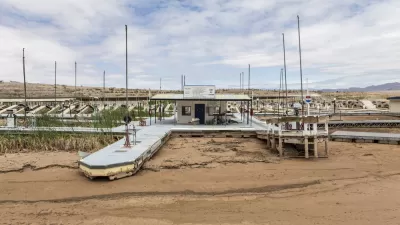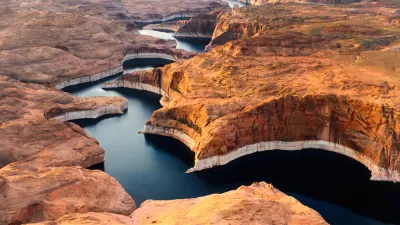New agreements and the first cutbacks in water usage signal the start of concerted efforts keep the river and reservoirs from dropping to dangerous levels.

Ian James reports that water deliveries from the Colorado River will be reduced for Arizona, Nevada, and Mexico next year. Projections show that the water level of Lake Mead, which is now 39 percent full, will drop to below threshold levels at the start of the year. California and Mexico have also agreed to contribute water to the reservoir if levels continue to drop.
"The Colorado River’s reservoirs have dropped dramatically since 2000 during one of the most extreme droughts in centuries. Farms and cities across the Southwest have long been taking more from the river than what flows into it, and climate change is adding to the strains by pushing up temperatures," notes James.
This is the first time such restrictions have gone into place. Even with a winter of heavy snows that increased runoff into Lake Mead, reduced stream flow and more evaporation in past years from rising temperatures were pointing to future shortages.
"[Jennifer Pitt] said having the drought agreement in place now gives water managers several years to study scenarios of extremes, and come up with new rules to 'create the resilience that we need in the Colorado River basin to respond to whatever conditions are coming our way,'" notes James.
FULL STORY: First-ever mandatory water cutbacks will kick in next year along the Colorado River

Planetizen Federal Action Tracker
A weekly monitor of how Trump’s orders and actions are impacting planners and planning in America.

Maui's Vacation Rental Debate Turns Ugly
Verbal attacks, misinformation campaigns and fistfights plague a high-stakes debate to convert thousands of vacation rentals into long-term housing.

San Francisco Suspends Traffic Calming Amidst Record Deaths
Citing “a challenging fiscal landscape,” the city will cease the program on the heels of 42 traffic deaths, including 24 pedestrians.

Defunct Pittsburgh Power Plant to Become Residential Tower
A decommissioned steam heat plant will be redeveloped into almost 100 affordable housing units.

Trump Prompts Restructuring of Transportation Research Board in “Unprecedented Overreach”
The TRB has eliminated more than half of its committees including those focused on climate, equity, and cities.

Amtrak Rolls Out New Orleans to Alabama “Mardi Gras” Train
The new service will operate morning and evening departures between Mobile and New Orleans.
Urban Design for Planners 1: Software Tools
This six-course series explores essential urban design concepts using open source software and equips planners with the tools they need to participate fully in the urban design process.
Planning for Universal Design
Learn the tools for implementing Universal Design in planning regulations.
Heyer Gruel & Associates PA
JM Goldson LLC
Custer County Colorado
City of Camden Redevelopment Agency
City of Astoria
Transportation Research & Education Center (TREC) at Portland State University
Jefferson Parish Government
Camden Redevelopment Agency
City of Claremont




























